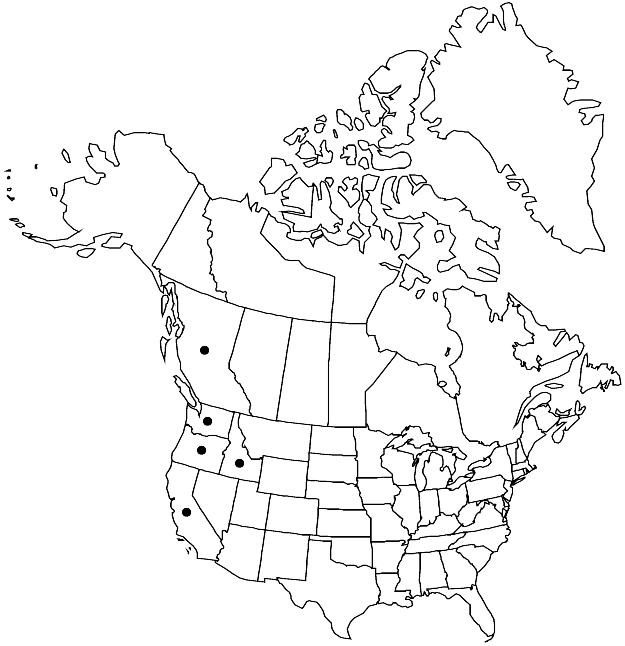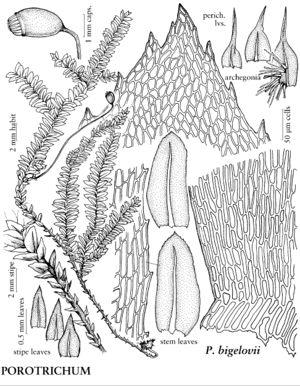Difference between revisions of "Porotrichum bigelovii"
Canad. Rec. Sci. 6: 18. 1894.
FNA>Volume Importer |
FNA>Volume Importer |
||
| Line 36: | Line 36: | ||
|elevation=low to moderate elevations (0-600 m) | |elevation=low to moderate elevations (0-600 m) | ||
|distribution=B.C.;Calif.;Idaho;Oreg.;Wash. | |distribution=B.C.;Calif.;Idaho;Oreg.;Wash. | ||
| − | |discussion=<p>In the flora area, Porotrichum bigelovii is immediately distinguished from other dendroid mosses by its soft appearance due to the complanate leaves and stem. In addition, the costa narrowing toward the apex separates P. bigelovii from species of Thamnobryum.</p> | + | |discussion=<p>In the flora area, <i>Porotrichum bigelovii</i> is immediately distinguished from other dendroid mosses by its soft appearance due to the complanate leaves and stem. In addition, the costa narrowing toward the apex separates <i>P. bigelovii</i> from species of <i>Thamnobryum</i>.</p> |
|tables= | |tables= | ||
|references= | |references= | ||
| Line 60: | Line 60: | ||
|publication year=1894 | |publication year=1894 | ||
|special status=Endemic;Selected by author to be illustrated | |special status=Endemic;Selected by author to be illustrated | ||
| − | |source xml=https://jpend@bitbucket.org/aafc-mbb/fna-data-curation.git/src/ | + | |source xml=https://jpend@bitbucket.org/aafc-mbb/fna-data-curation.git/src/8f726806613d60c220dc4493de13607dd3150896/coarse_grained_fna_xml/V28/V28_964.xml |
|genus=Porotrichum | |genus=Porotrichum | ||
|species=Porotrichum bigelovii | |species=Porotrichum bigelovii | ||
Revision as of 18:09, 18 September 2019
Plants 2–5 cm. Primary stems complanate-foliate. Primary stem leaves erect-spreading, deltoid, 1–2 mm; margins plane, entire to slightly serrulate; apex acute; costa double, short, or single; basal laminal cells elongate-rhomboidal, 4–10 × 1 µm, smooth; apical cells elongate-rhomboidal, 5–8 µm. Secondary stem leaves 2.5–3 mm; basal laminal cells 8 × 1 µm; medial cells 5–10 × 1 µm; apical cells rhombic to rhomboidal, 3–5 × 2–3 µm. Branch leaves erect to erect-spreading, 1.5 mm; costa to 3/4 leaf length; basal laminal cells 7–10 × 2–3 µm; medial cells 3–7 × 2 µm; apical cells rhombic 3–4 × 2 µm. Perichaetial inner leaves with margins serrate distally, ecostate or costate, distal medial laminal cells fusiform to linear. Seta reddish brown. Capsule erect to horizontal; exostome teeth from broad base tapering toward apex; endostome cilia present.
Phenology: Capsules mature Mar–Aug.
Habitat: Soil, rock, logs, under shaded cliffs or shaded boulders by streams, wet rock crevices in forests
Elevation: low to moderate elevations (0-600 m)
Distribution

B.C., Calif., Idaho, Oreg., Wash.
Discussion
In the flora area, Porotrichum bigelovii is immediately distinguished from other dendroid mosses by its soft appearance due to the complanate leaves and stem. In addition, the costa narrowing toward the apex separates P. bigelovii from species of Thamnobryum.
Selected References
None.
